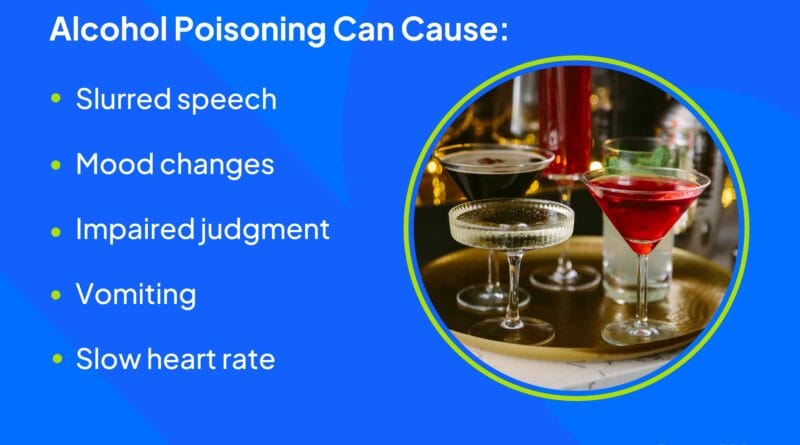Alcohol Poisoning: Signs and Symptoms

Alcohol poisoning is a life-threatening condition that happens when toxic levels of alcohol cause areas of the brain that control essential functions to shut down. This condition occurs when you drink large amounts of alcohol in a short period.
Alcohol poisoning can cause various levels of impairment, leading to symptoms like slurred speech, mood changes, and vomiting. Your exact symptoms will depend on how much alcohol you’ve been drinking.
If you drink too much alcohol too quickly, your liver can’t remove it fast enough. This causes the amount of alcohol in the blood, also known as blood alcohol concentration (BAC), to rise.
As you keep drinking and your BAC increases, alcohol poisoning may occur. If left untreated, alcohol poisoning can lead to brain damage or death, so it’s important to receive medical care immediately if you or someone you know is experiencing symptoms of alcohol poisoning after drinking.
Design by Health / Getty Images
Alcohol enters the bloodstream within minutes of drinking, and it takes about 30-90 minutes for the blood alcohol level to reach its highest point.
Drinking alcohol may feel pleasant initially. You might feel relaxed or a bit sleepy. Some people become more outgoing or talkative. These effects are signs your body is already working hard to process the alcohol. At this stage, your BAC is usually between 0.0-0.05%.
This level of alcohol use can lead to mild impairment of speech, memory, attention, coordination, and balance. Here are some examples of how that might manifest:
- You stumble over words when telling a story to your friends
- You forget where you put your keys
- Your attention starts to drift during a conversation
- You feel off-balanced when walking
- You lose some of your fine motor skills, such as not being able to pick up your fork to eat food
As you drink more alcohol, the symptoms of impairment worsen. What started as relaxation can turn into stronger intoxication. At this point, your BAC is usually between 0.06-0.15%. For most people, this leads to more difficulties with speech, memory, attention, coordination, and balance.
You may also experience:
- Increased aggression, like getting into a heated argument with a friend
- Changes in mood
- Higher risk of falls and injuries
- Impaired judgment
- Inability to drive safely
- Forgetting important details, such as how you got home or who you talked to at a party
When impairment becomes severe, the symptoms can be life-threatening. At this stage, BAC is usually between 0.16-0.30%. During this stage, you may:
- Find it hard to speak clearly
- Have difficulty remembering things
- Not be able to stand up straight or walk in a line
- Lose the ability to make rational decisions
- Experience a complete loss of memory
- Vomit
- Feel faint or lose consciousness
- Notice double vision
These symptoms indicate that alcohol is seriously affecting your body and vital functions like memory and awareness. If you notice someone experiencing these symptoms, it’s important to get them to stop drinking to prevent symptoms from worsening and becoming life-threatening.
If alcohol consumption continues beyond the severe impairment stage, symptoms can be critical or life-threatening. This usually occurs with a BAC of 0.31-0.45% or higher.
The amount of alcohol that can cause alcohol poisoning isn’t the same for everyone. Your age, sex, and how quickly you’re drinking all play a role. Other factors include your medications and how much food you eat before drinking.
Drinking on an empty stomach and taking sleeping pills, antidepressants, or pain relievers can make it easier for alcohol to enter your bloodstream and strengthen its effects.
At this stage, brain activity can slow down so much that your memory and ability to stay awake are severely impaired. You may experience a complete loss of memory, confusion, difficulty staying awake, or the inability to wake up.
Alcohol poisoning can also affect the brain’s ability to perform basic functions like breathing, regulating body temperature, keeping the heart beating, and maintaining reflexes. Signs that your vital functions are impaired include:
- Slow breathing (bradypnea): Taking fewer than eight breaths each minute
- Irregular breathing (apnea): Pauses of 10 or more seconds between each breath
- Slow heart rate (bradycardia): A heart rate below 50-60 beats per minute
Other life-threatening symptoms include:
- Hypothermia (low body temperature)
- Shivering and pale skin
- Seizures
- Extremely low blood sugar
If you or someone you know has any of the above symptoms, seeking medical care urgently is essential.
Suffocation and Death
Alcohol poisoning can impair necessary reflexes in your body, particularly the gag reflex—which helps prevent choking on food, liquids, and saliva. An improperly functioning gag reflex significantly increases the risk of choking.
Many people with alcohol poisoning vomit. If the gag reflex isn’t working, the vomit can enter the airway and lungs instead, leading to suffocation and a lack of oxygen and resulting in brain damage or even death.
If you see signs of alcohol poisoning in yourself or someone else, call 911 right away. This is an emergency, and every minute counts. Only professional medical help can prevent lasting brain damage or death.
While waiting for the ambulance:
- Keep a close eye on the person
- Roll them on their side to prevent choking if they vomit
- Try to keep them awake if you can
Even if someone has stopped drinking and appears to be getting better, they could still be in danger. Alcohol left in their stomach and intestines can continue to enter the bloodstream, potentially worsening symptoms.
Alcohol poisoning is a dangerous condition that can happen when someone drinks too much alcohol too quickly. When the body is overwhelmed by a toxic amount of alcohol, it can severely affect vital functions.
You might initially notice mild effects like slurred speech, forgetfulness, or clumsiness. As drinking continues and excess alcohol enters the blood, alcohol poisoning can occur and cause symptoms like extremely slow heart rate and breathing, low body temperature, seizures, and choking on vomit.
If you see any signs of alcohol poisoning, get medical help immediately.





